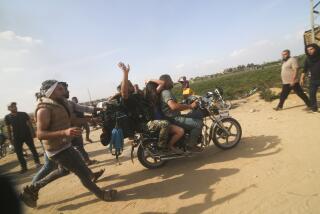Rights Group Blames Ruling Party for 1997 Kenyan Violence
- Share via
NAIROBI, Kenya — President Daniel Arap Moi’s party hired armed thugs to attack and intimidate likely opposition supporters during the 1997 election, according to an international human rights group, which warned Friday that similar violence could be fomented before new balloting later this year.
The attacks in Coast province, near the ancient port city of Mombasa, claimed the lives of an estimated 100 Kenyans. More than 100,000 others were forced to flee their homes.
No one was prosecuted for organizing the attacks, despite hundreds of arrests and a government-sponsored commission of inquiry. But in a 119-page report released here Friday, Human Rights Watch laid the blame on Moi’s Kenya African National Union party for instigating the violence.
Researchers said they interviewed so-called hired raiders who recounted how they received weapons and other support from the party.
“This report is meant to sound a warning,” said Lisa Misol, the Human Rights Watch official who wrote the study. “This is an important time as Kenya gears up for the next general election.”
Officials of KANU, which has ruled this East African nation since independence from Britain in 1963, have consistently denied any involvement in the violence. A top party official said Friday that the ruling party has no intention of stirring up ethnic rivalries during the forthcoming election, expected in December. Moi is required by law to step down then after 24 years in office.
U.S. officials and many human rights groups said they will closely monitor the election, particularly because Kenya is often perceived as a bastion of stability in a region fraught with conflict.
Human Rights Watch said that, to maintain their grip on power in 1997, Kenya’s leaders resorted to pitting ethnic groups against one another. The report compared such tactics to ones used in Rwanda in 1994, when elite ethnic Hutus directed the massacre of more than 800,000 ethnic Tutsis and moderate Hutus.
“The methods employed in Rwanda’s genocide were replicated on a much smaller but still deadly scale in Kenya,” the report said.
Misol said Moi’s party masterminded the violence in Coast province to drive opposition supporters out of the area so it could win back seats in parliament it had lost five years earlier.
KANU leaders hired and armed unemployed young men from the indigenous Digo group, who blamed their lack of jobs, land and educational opportunities on migrants from the country’s interior, Misol said. The coastal residents historically have backed KANU while the citizens from the interior tend to favor the opposition.
The raiders told researchers how they were recruited and trained by fighters hired by KANU. Apart from attacking innocent civilians, the raiders waged a terror campaign through handwritten pamphlets calling for coastal Kenyans to chase away outsiders.
After the opposition voters fled their homes, KANU won an overwhelming number of seats in the region. Moi, who needed at least 25% of the presidential vote in Coast to win reelection, handily carried the province.
KANU, Misol said, had simply dusted off tactics used in Rift Valley province before the 1992 presidential vote, when opposition supporters from the Kikuyu, Luhya and Luo ethnic groups were attacked in Moi’s home province by members of the president’s Kalenjin group. About 1,500 people were killed and 250,000 forced to flee.
Misol said the raiders who agreed to be interviewed by Human Rights Watch reported that KANU officials didn’t keep their promises to give them land and other rewards.
Misol said the widespread availability of guns in Kenya--which is already beset by ethnic divisions, a rickety economy and rampant corruption--could fuel renewed violence during the next elections.
Guns from conflict-ridden neighbors--such as Sudan, Somalia and Congo--are spilling into Kenya, mainly in the northern and western areas of the country, the report said. The growing number of guns has led to increased crime.
Misol said Western countries that provide aid to Kenya should pressure the government to stem the gun trade and insist that officials account for past political violence.
More to Read
Sign up for Essential California
The most important California stories and recommendations in your inbox every morning.
You may occasionally receive promotional content from the Los Angeles Times.













